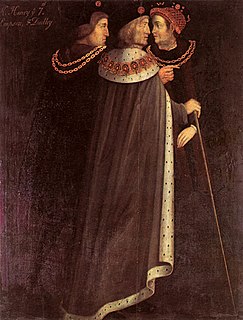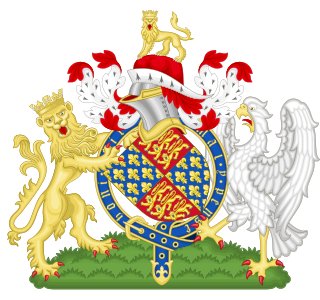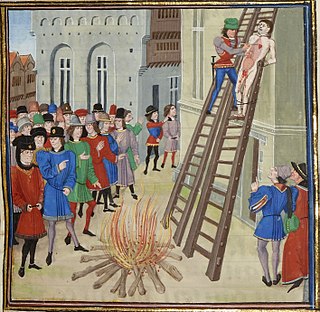
The Long Parliament was an English Parliament which lasted from 1640 until 1660. It followed the fiasco of the Short Parliament, which had convened for only three weeks during the spring of 1640 after an 11-year parliamentary absence. In September 1640, King Charles I issued writs summoning a parliament to convene on 3 November 1640. He intended it to pass financial bills, a step made necessary by the costs of the Bishops' Wars in Scotland. The Long Parliament received its name from the fact that, by Act of Parliament, it stipulated it could be dissolved only with agreement of the members; and those members did not agree to its dissolution until 16 March 1660, after the English Civil War and near the close of the Interregnum.

Treason is the crime of attacking a state authority to which one owes allegiance. This typically includes acts such as participating in a war against one's native country, attempting to overthrow its government, spying on its military, its diplomats, or its secret services for a hostile and foreign power, or attempting to kill its head of state. A person who commits treason is known in law as a traitor.

The Rump Parliament was the English Parliament after Colonel Thomas Pride purged the Long Parliament, on 6 December 1648, of those members hostile to the Grandees' intention to try King Charles I for high treason.

The Bloody Assizes were a series of trials started at Winchester on 25 August 1685 in the aftermath of the Battle of Sedgemoor, which ended the Monmouth Rebellion in England.

Under the law of the United Kingdom, high treason is the crime of disloyalty to the Crown. Offences constituting high treason include plotting the murder of the sovereign; committing adultery with the sovereign's consort, with the sovereign's eldest unmarried daughter, or with the wife of the heir to the throne; levying war against the sovereign and adhering to the sovereign's enemies, giving them aid or comfort; and attempting to undermine the lawfully established line of succession. Several other crimes have historically been categorised as high treason, including counterfeiting money and being a Catholic priest.

The Popish Plot was a fictitious conspiracy invented by Titus Oates that between 1678 and 1681 gripped the Kingdoms of England and Scotland in anti-Catholic hysteria. Oates alleged that there was an extensive Catholic conspiracy to assassinate Charles II, accusations that led to the executions of at least 22 men and precipitated the Exclusion Bill Crisis. Eventually Oates's intricate web of accusations fell apart, leading to his arrest and conviction for perjury.
The privilege of peerage is the body of special privileges belonging to members of the British peerage. It is distinct from parliamentary privilege, which applies only to those peers serving in the House of Lords and the members of the House of Commons, while Parliament is in session and forty days before and after a parliamentary session.
In English criminal law, attainder or attinctura was the metaphorical "stain" or "corruption of blood" which arose from being condemned for a serious capital crime. It entailed losing not only one's life, property and hereditary titles, but typically also the right to pass them on to one's heirs. Both men and women condemned of capital crimes could be attainted.

William Russell, Lord Russell, was an English politician. He was a leading member of the Country Party, forerunners of the Whigs, who during the reign of King Charles II, laid the groundwork for opposition in the House of Commons to the accession of an openly Catholic king in Charles's brother James. This ultimately resulted in Russell's execution for treason, almost two years before Charles died and James acceded to the throne.

Edmund Dudley was an English administrator and a financial agent of King Henry VII. He served as a leading member of the Council Learned in the Law, Speaker of the House of Commons and President of the King's Council. After the accession of Henry VIII, he was imprisoned in the Tower of London and executed the next year on a treason charge. While waiting for his execution he wrote The Tree of Commonwealth. Edmund Dudley was also the grandfather of Robert Dudley, 1st Earl of Leicester, a favourite of Henry VIII's daughter, Elizabeth I.
The Treason of the Long Knives is a pseudohistorical myth and legend of a massacre of British Celtic chieftains by Anglo-Saxon soldiers at a peace conference on Salisbury Plain in the 5th century. The story is not included in any contemporary accounts, but does feature centuries later in the semi-mythological histories of the Historia Brittonum and the Historia Regum Britanniae. Though a popular cautionary tale in medieval Europe, no historical evidence for The Treason of the Long Knives exists, and the story is now widely understood as a purely literary construction by historians.
The Sydney Twelve were members of the Industrial Workers of the World arrested on 23 September 1916 in Sydney, Australia, and charged with treason under the Crimes Act 1900 (NSW) which incorporated the Treason Felony Act 1848 (Imp). They were John Hamilton, Peter Larkin, Joseph Fagin, William Teen, Donald Grant, Benjamin King, Thomas Glynn, Donald McPherson, Thomas Moore, Charles Reeve, William Beattie, and Bob Besant. The treason charges were dropped prior to trial and replaced with three conspiracy charges: (1) conspiracy to commit arson (2) conspiracy to procure the release of Tom Barker from gaol by unlawful means and (3) conspiracy to excite sedition.

The Treason Act 1351 is an Act of the Parliament of England which codified and curtailed the common law offence of treason. No new offences were created by the statute. It is one of the earliest English statutes still in force, although it has been very significantly amended. It was extended to Ireland in 1495 and to Scotland in 1708. The Act was passed at Westminster in the Hilary term of 1351, in the 25th year of the reign of Edward III and was entitled "A Declaration which Offences shall be adjudged Treason". It was passed to clarify precisely what was treason, as the definition under common law had been expanded rapidly by the courts until its scope was controversially wide. The Act was last used to prosecute William Joyce in 1945 for collaborating with Germany in World War II.

Lady Jane Grey, later known as Lady Jane Dudley and as the "Nine Days' Queen", was a teenage English noblewoman who claimed the throne of England and Ireland from 10 July until 19 July 1553.

The High Court of Justice was the court established by the Rump Parliament to try Charles I, King of England, Scotland and Ireland. Even though this was an ad hoc tribunal that was specifically created for the purpose of trying the king, its name was eventually used by the government as a designation for subsequent courts.

To be hanged, drawn and quartered became a statutory penalty for men convicted of high treason in the Kingdom of England from 1352, although similar rituals are recorded during the reign of King Henry III (1216–1272). The convicted traitor was fastened to a hurdle, or wooden panel, and drawn by horse to the place of execution, where he was then hanged, emasculated, disembowelled, beheaded, and quartered. His remains would then often be displayed in prominent places across the country, such as London Bridge, to serve as a warning of the fate of traitors. For reasons of public decency, women convicted of high treason were instead burned at the stake.

The Treason Act 1397 was an Act of the Parliament of England. It was supplemented by six other Acts. The seven Acts together dealt with high treason.

John Cook was the first Solicitor General of the English Commonwealth and led the prosecution of Charles I. Following The Restoration, Cook was convicted of regicide and hanged, drawn and quartered on 16 October 1660. He is considered an international legal icon and progenitor of international criminal law for being the first lawyer to prosecute a head of state for crimes against his people.

The Court of Castle Chamber was an Irish Court of special jurisdiction which operated in the sixteenth and seventeenth centuries.
In the United States, there are both federal and state laws prohibiting treason. Treason is defined on the federal level in Article III, Section 3 of the United States Constitution as: "levying War against [the United States], or in adhering to their Enemies, giving them Aid and Comfort." Most state constitutions include similar definitions of treason, specifically limited to levying war against the state, "adhering to the enemies" of the state, or aiding the enemies of the state, and requiring two witnesses or a confession in open court. Fewer than thirty people have ever been charged with treason under these laws.